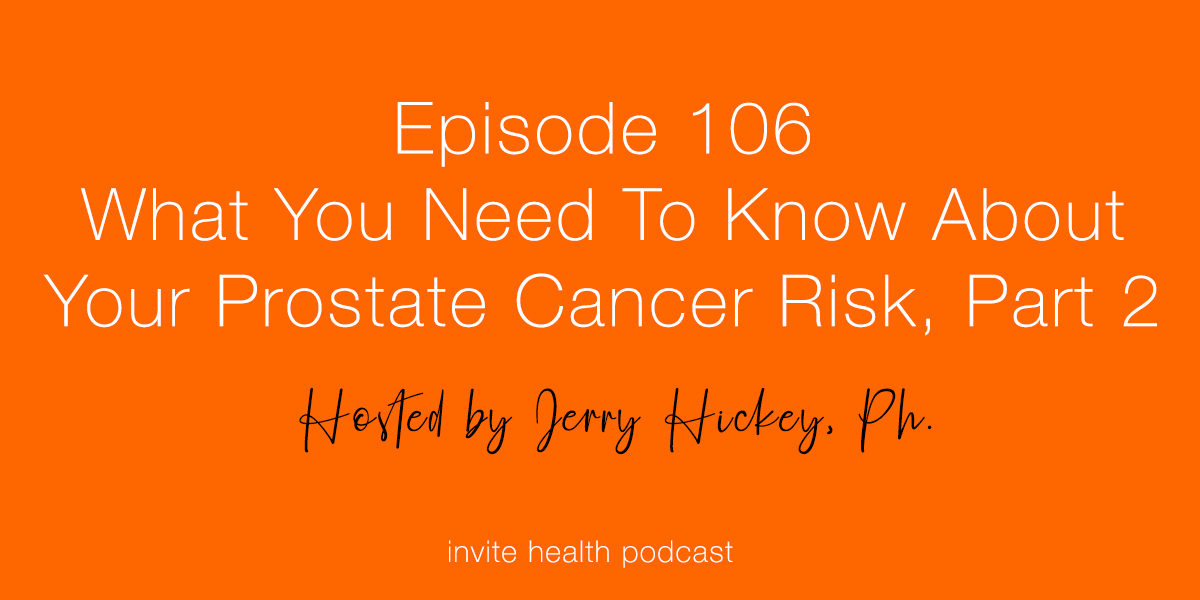What You Need To Know About Your Prostate Cancer Risk, Part 2 – Invite Health Podcast, Episode 106

Invite Health Podcast, Episode hosted by Jerry Hickey. Ph
Subscribe Today!
Welcome to Part 2 of What You Need To Know About Your Prostate Cancer Risk! If you missed Part 1, click here to listen now! On today’s episode, we are going to discuss additional changes you should implement throughout your life that can help to reduce your risk of prostate cancer.
Cruciferous Vegetables
These are cabbage-related vegetables that include kale, cabbage, Brussels sprouts and broccoli. When you break down cabbage vegetables the ingredients inside of them are being worked on by the bacteria in your intestines. Glurionic acid has been shown to seal toxins into your stool, which can be extremely beneficial for constipation. Sulfuraphane has been shown to stimulate phase two detoxification (breaking down chemicals and toxins in your body) and it is known as a powerful antioxidant. The healthy bacteria found in the intestines converts Indole-3-Carbinol into a number of different substances that are thought to be protective for women and men’s sexual organs. The most important derivative made from Indole-3-Carbinol is DIM (Diindolylmethane).†
Flax Seed
Duke University performed several studies on Flax Seed. Flax seed contains protein, all three groups of essential fatty acids (omega-3s, omega-6s and omega-9s), soluble and insoluble fiber, and lignans. In the journal Urology, researchers from Duke University published a pilot study where men we’re given flax seed with a fat restricted diet or a placebo. Results concluded that flax seed lowered their prostate specific antigen (PSA) significantly. These men had big prostates, elevated PSA, and were scheduled for biopsy’s. A number of these men no longer needed the biopsy, as their PSA levels went back to normal, according to the study. They also found that flax seed was preventing further enlargement, or growth of the prostate. Interestingly, flax seed had no effect on testosterone.†
Mushroomsq
In studies on breast cancer that have been performed in China – regions in China where there is a higher incidence – research found that women who frequently ate mushrooms had a lower risk, especially when consumed with green tea. Published in the International Journal of Cancer, researchers studied 63,500 men between 40 and 79 and followed them for a median of 13.2 years. Compared with not eating mushrooms very often (like once a month or once every two weeks), for the participants that ate mushrooms once or twice a week, prostate cancer risk was lowered. Eating mushrooms three or four times a week lowered their risk by 17%. This study was performed by Tohuko University School of Public Health, the Bekman Research Institute in California, and Penn State University in Pennsylvania.
Thank you for tuning in to the Invite Health Podcast. You can find all of our episodes for free wherever you listen to podcasts or by visiting www.invitehealth.com/podcast. Make sure you subscribe and leave us a review! Follow us on Facebook, Twitter and Instagram at Invite Health today. We’ll see you next time on another episode of the Invite Health Podcast.

